How to Buy Ethereum in 2024

Ready to dive into the exciting world of Ethereum? You’ve come to the right page. In this guide, I’ll walk you through the simple steps to buy Ethereum.
Whether you’re new to crypto-gambling or just starting your journey with Ethereum, I’ve got your back!
Here are the main topics we will cover;
- How to choose the best Ethereum exchange
- The best payment methods to use
- How to place orders
- Secure Ethereum Storage
- Top 5 ways to use ETH
Let’s get started.
Before we do, here are our top Ethereum exchanges where you can buy ETH–
Best Ethereum Exchanges in 2024
Here are the best Ethereum exchanges, according to our review team.
- Coinbase – best for beginners.
- Kraken – best for security.
- eToro – best for crypto exchanges.
- Binance – best for advanced trading options.
- Gemini – best for customer service.
Review of Our Top 5 Ethereum Exchanges
Before proceeding, I invite you to analyze the following quick reviews of the best Ethereum exchanges.
1. Coinbase Exchange Review

Overview: Coinbase is the largest U.S.-based exchange, founded in 2012 and headquartered in San Francisco, California. It is a beginner-friendly platform that offers a wide variety of options for users from beginners to advanced traders.
Tradable coins: Coinbase offers 50+ cryptocurrencies, including Ethereum.
Fees: Coinbase charges a spread of about 0.50% for cryptocurrency purchases and sales, and a Coinbase fee (which ranges from $0.99 to $2.99 depending on the transaction amount) for U.S. users. Coinbase also charges a variable fee (depending on the transaction amount and payment method) for converting between cryptocurrencies. Compared to its competitors, Coinbase’s fees are relatively high.
Pros:
- User-friendly interface and easy purchase process
- Broad selection of cryptocurrencies
- High liquidity
Cons:
- High fees compared to competitors
- Limited payment options
- Slow customer support
Visit Coinbase for more info.
2. Kraken Review
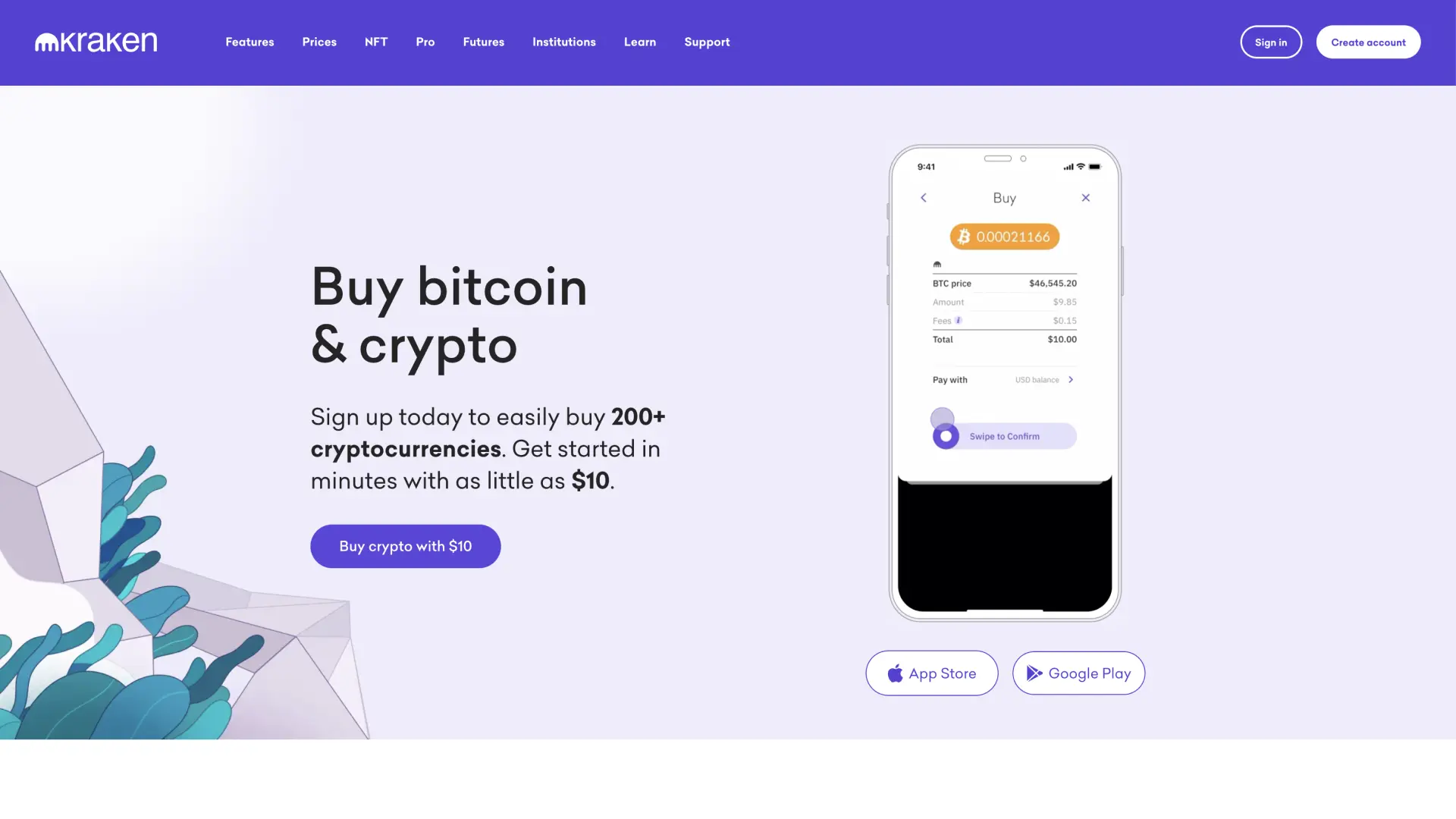
Overview: Kraken is a well-established exchange founded in 2011 and headquartered in San Francisco, California. It is known for its high security standards and advanced trading options.
Tradable coins: Kraken offers 70+ cryptocurrencies, including Ethereum.
Fees: Kraken charges a maker-taker fee structure that ranges from 0% to 0.26% depending on the trading volume. Compared to its competitors, Kraken’s fees are relatively low.
Pros:
- High security standards
- Advanced trading options
- Low fees compared to competitors
Cons:
- Slow customer support
- Limited payment options
- Not beginner-friendly
Visit Kraken
3. eToro Exchange Review
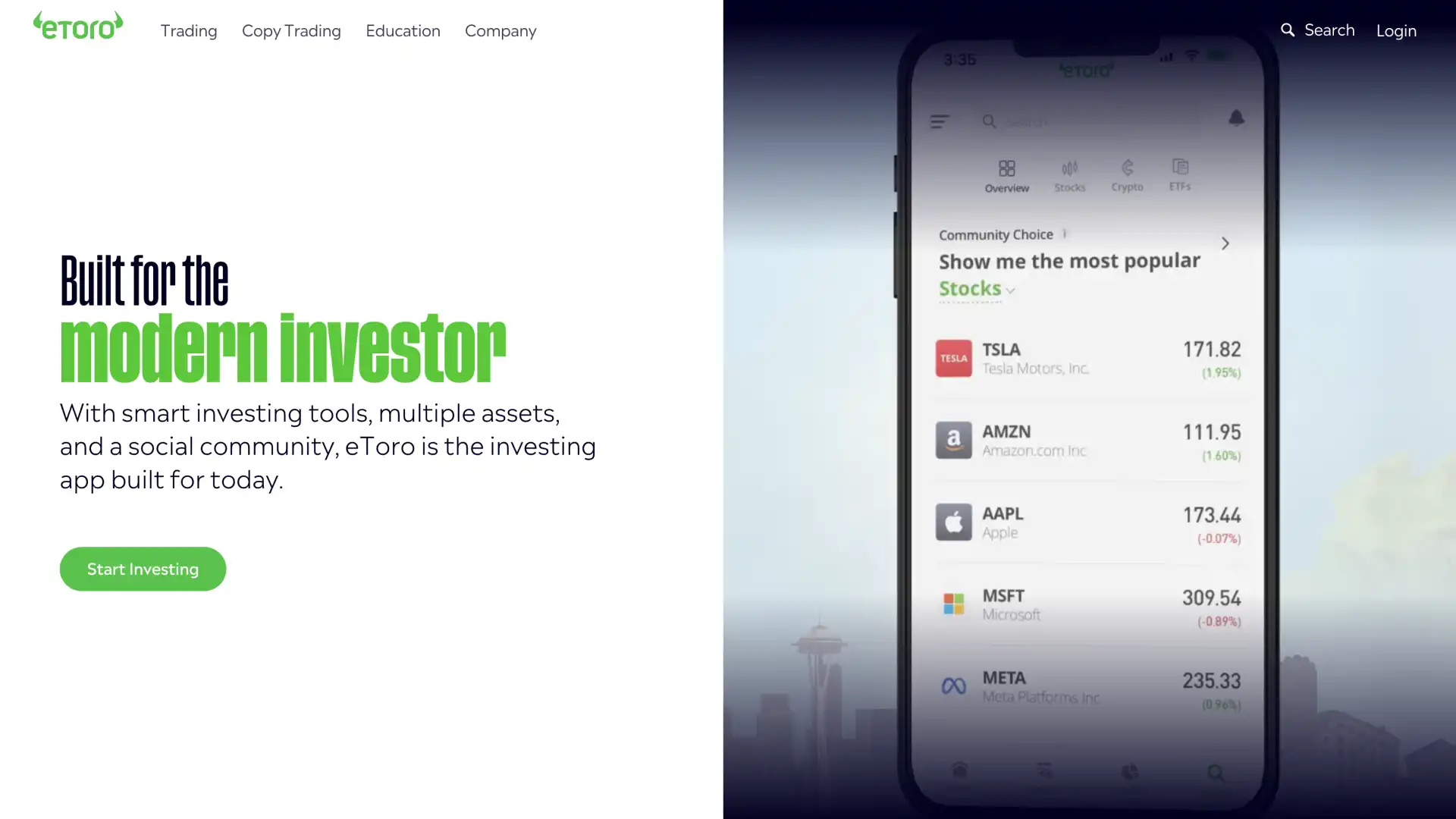
Overview: eToro is a social trading platform founded in 2007 and headquartered in Israel. It is known for its user-friendly interface and copy trading feature.
Tradable coins: eToro offers 20+ cryptocurrencies, including Ethereum.
Fees: eToro charges a spread of about 0.75% for cryptocurrency purchases and sales. Compared to its competitors, eToro’s fees are relatively high.
Pros:
- User-friendly interface
- Copy trading feature
- Regulated by multiple authorities
Cons:
- High fees compared to competitors
- Limited cryptocurrency selection
- Limited payment options
Find out more at eToro
4. Binance Exchange Review

Overview: Binance is a well-established exchange founded in 2017 and headquartered in Malta. It is known for its advanced trading options and high liquidity.
Tradable coins: Binance offers 300+ cryptocurrencies, including Ethereum.
Fees: Binance charges a maker-taker fee structure that ranges from 0.02% to 0.10% depending on the trading volume and whether the user holds Binance Coin (BNB). Compared to its competitors, Binance’s fees are relatively low.
Pros:
- Advanced trading options
- High liquidity
- Low fees compared to competitors
Cons:
- Not beginner-friendly
- Limited payment options
- Security concerns in the past
Check out Binance to explore this exchange.
5. Gemini Exchange Review
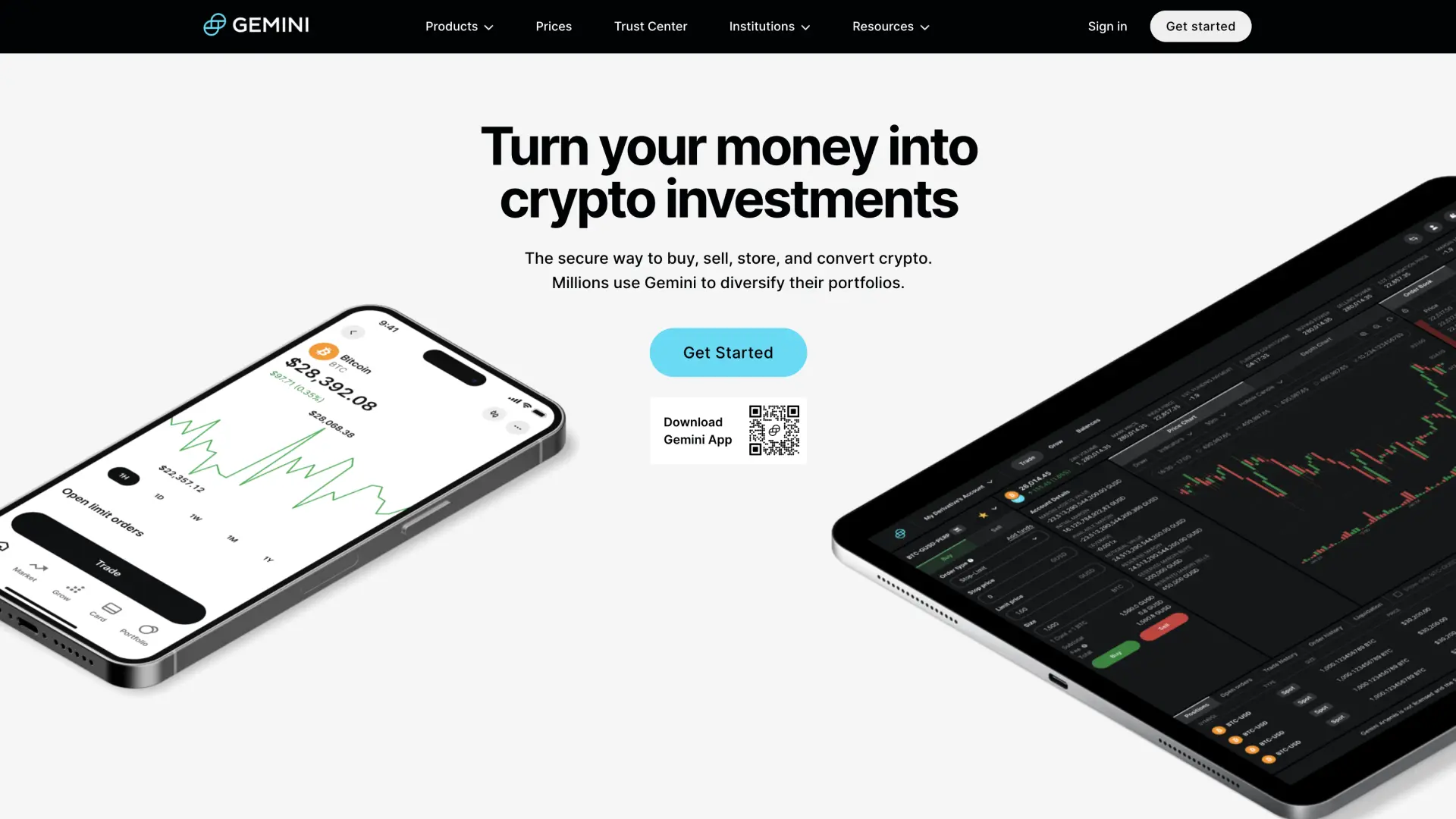
Overview: Gemini is a well-established exchange founded in 2014 and headquartered in New York City. It is known for its customer service offerings and regulatory compliance.
Tradable coins: Gemini offers 40+ cryptocurrencies, including Ethereum.
Fees: Gemini charges a maker-taker fee structure that ranges from 0.35% to 1.00% depending on the trading volume. Compared to its competitors, Gemini’s fees are relatively high.
Pros:
- High security standards
- Strong regulatory compliance
- Good customer service offerings
Cons:
- High fees compared to competitors
- Limited cryptocurrency selection
- Limited payment options
Visit Gemini for more information.
Disclaimer: Investing in cryptocurrencies carries significant risk. Values are highly volatile. Never invest more than you can afford to lose. This site does not provide financial advice. Act based on your own research and consult with a financial professional before making decisions. Don’t invest unless you’re prepared to lose all the money you invest.
Choosing the Right Platform

First things first, to buy Ethereum, you’ll need a reliable Ethereum exchange to facilitate your transactions. There are various options available, each with its pros and cons. Here are three common methods:
Exchanges
Crypto exchanges are digital platforms where you can buy, sell, and trade cryptocurrencies. They offer user-friendly interfaces, providing access to a wide range of digital assets, including Ethereum. Some popular exchanges include Coinbase, Binance, and Kraken.
Peer-to-Peer (P2P) Transactions
P2P platforms connect buyers and sellers directly, allowing you to negotiate the terms of the trade. This method often provides more privacy and flexibility but requires extra caution to avoid scams. Paxful is one of the popular P2P platforms.
Gift Cards
Believe it or not, you can even buy Ethereum using gift cards! Some platforms allow you to exchange gift cards for Ethereum. While it might be a less conventional method, it can be useful if you have unused gift cards lying around.
Choosing a Payment Method
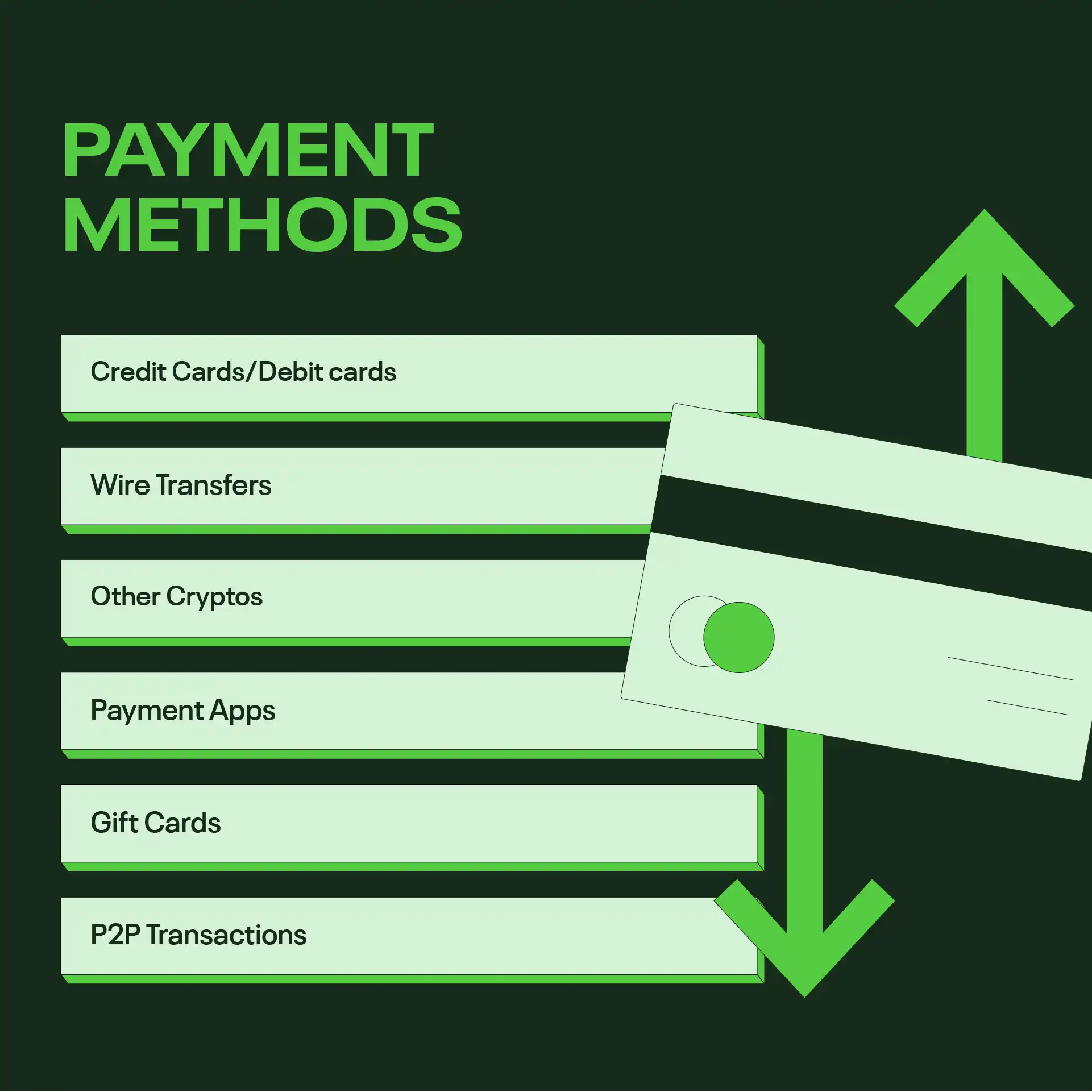
Once you’ve selected a platform, it’s time to select a payment method. Different platforms offer various options, including credit cards and e-Wallets.
Credit/Debit Cards
Many trading apps accept credit and debit card payments for instant Ethereum purchases. Bank cards are quick and convenient for beginners, but keep in mind that fees may be higher than other payment options. Visa and Mastercard are the top acceptable bank cards. Luckily, these are known for their stringent security measures.
Bank Transfers
With lower fees, bank transfers are a more cost-effective way to buy Ethereum. However, the process might take a bit longer, usually a few business days. If credit cards are not available in your region, bank transfer is an excellent option. Since this payment method asks you for your bank account details, we recommend you only use it at licensed cryptocurrency exchanges.
E-Wallets
Some exchanges allow payments through third-party payment processors like PayPal, Skrill, or Neteller. These are convenient banking options since your deposits and withdrawals are processed fast. Also, you don’t have to share your bank details with the exchange. In this sense, your financial data are guaranteed to remain private and safe.
Setting Up a Payment Method

Once you’ve decided on a payment method, you’ll need to set it up on your chosen platform. Here’s how:
- Credit/Debit Cards: Simply enter your card details as prompted on the platform. Some ETH trading sites may require additional verification for security purposes.
- Bank Transfers: Connect your bank account to the exchange by providing the necessary information. The crypto trading site will likely make a small deposit to verify your account, which you’ll need to confirm.
- E-Wallet: Link your payment processor account to the platform and follow any verification steps required.
Placing an Order
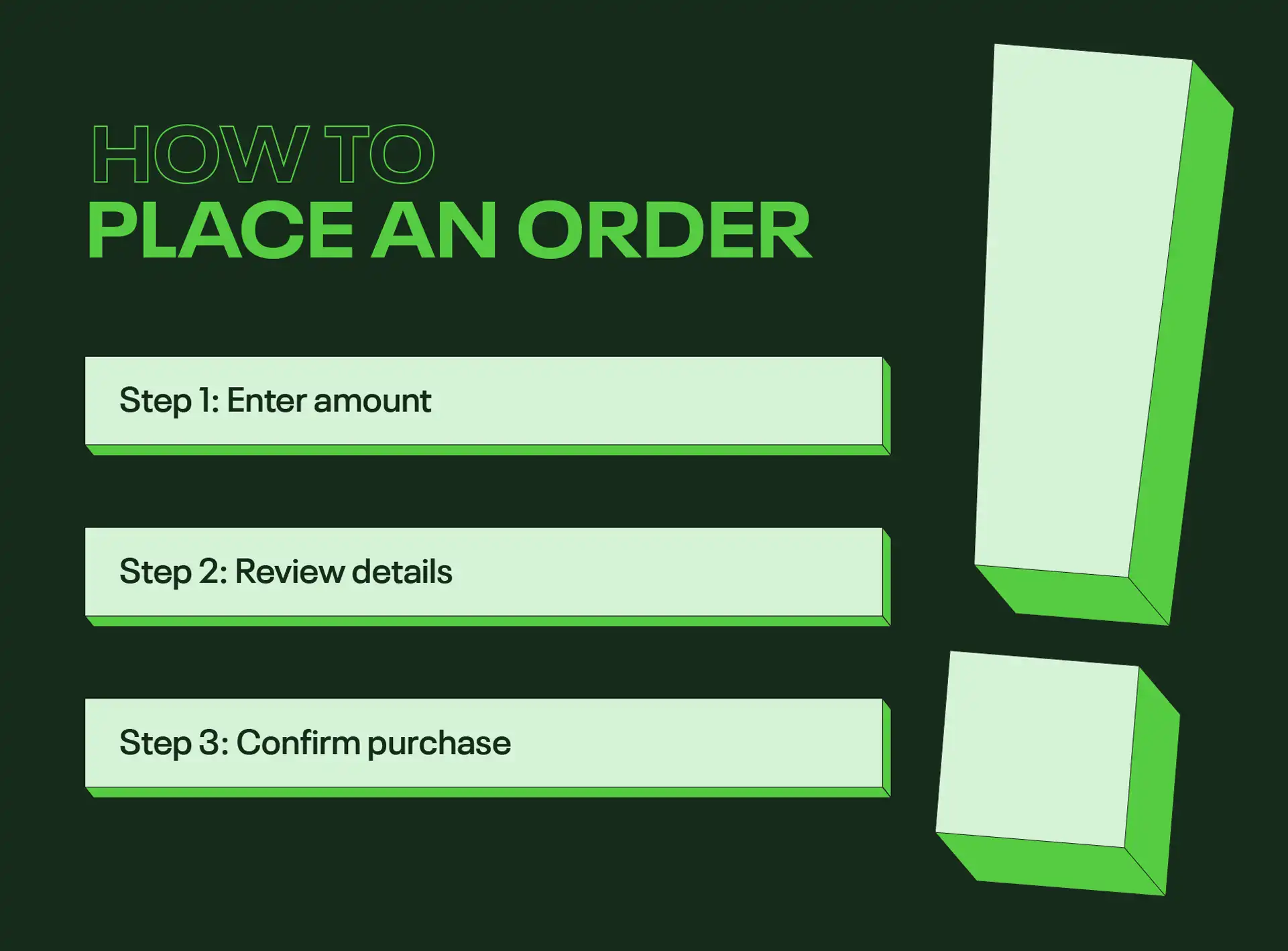
With your payment method set up, you’re now ready to place an order for Ethereum. The process may vary slightly depending on the platform, but generally, it involves the following steps:
- Step 1: Enter the amount. Specify the amount of Ethereum you want to purchase or the amount of fiat currency you’re willing to spend.
- Step 2: Review the details: Double-check all the details, including the transaction amount and any associated fees.
- Step 3: Confirm the purchase: Once you’re satisfied with the order details, confirm the purchase and the platform will process your order.
Storing Your Ethereum Securely

Congratulations, you’re now a proud Ethereum owner! But before you start crypto-gambling or using Ethereum for other purposes, it’s crucial to store it securely. Consider these secure storage options:
- Hardware Wallets: Hardware wallets are physical devices that store your Ethereum offline, providing high security. Examples include Ledger and Trezor wallets.
- Software Wallets: Software wallets are applications installed on your computer or smartphone. While convenient, they may be a greater risk of hacking.
- Paper Wallets: Paper wallets involve printing your Ethereum’s public and private keys on paper and storing them offline.
How to Use Ethereum

So you’ve got some ETH in your crypto wallet, and are wondering how to make the most out of it. Here are 5 awesome ways to put your Ethereum to work and potentially grow its value.
ETH investments
Did you know that your ETH can be a superstar investment asset like stocks? You can dive into exciting ventures like decentralized finance (DeFi) projects. But hang on a sec – before you jump in headfirst, take a deep breath and do your homework. Research is key when it comes to investments.
ETH betting & gaming
Are you a sports fan who also enjoys a good game of chance? Well, guess what? Some crypto sports betting sites let you use your ETH to place bets on your favorite teams! From football to basketball, you’ve got options. And if sports aren’t your thing, how about trying your luck with some thrilling slots or table games? Remember, only bet what you can afford to lose, and keep it fun!
Trade for short-term profits
Are you up for a bit of excitement and have a knack for reading the market? Ethereum trading might be right up your alley! You can gain some short-term profits when you buy low and sell when the ETH prices are high. But here’s a heads-up: trading can be risky, so some technical knowledge is necessary.
Holding
You can decide to keep your Ethereum and wait for its value to skyrocket. It’s like planting a seed and watching it grow into a money tree! Just remember, the crypto market can be wild, so do your research and be prepared for some roller-coaster rides!
Shopping and online purchases
Nowadays, lots of cool merchants, both online and offline, accept ETH as payment. So, instead of swiping your credit card, why not spend some Ethereum on that snazzy new gadget or the latest fashion trend? It’s a win-win – you get what you want, and you support the crypto revolution!
Final Word
This comprehensive guide navigates users through the process of acquiring and using Etheruem. By evaluating top exchanges like Coinbase, Kraken, eToro, Binance, and Gemini, users gain insights into important factors to make informed decisions. Exploring payment methods such as credit cards, bank transfers, and e-wallets simplifies the setup process.
We covered purchasing Ethereum and the importance of secure storage methods like hardware wallets, software wallets, and paper wallets. Beyond acquisition, we also outlined five ways to use Ethereum. These include investment assets, in gaming and betting, for short-term trading, long-term holding, and for everyday shopping experiences.
Frequently Asked Questions
Are there any specific regulations or restrictions for buying Ethereum in 2024?
Users will have to research the laws in their country/state and consult with their tax professionals to answer this question. Regulations vary from place to place. In the US, cryptocurrency transactions are treated as property and are subject to capital gains tax.
How do I create a digital wallet to store my purchased Ethereum?
There are several options for storing Ethereum. After purchasing ETH, it will be deposited into an exchange-hosted hot wallet that the exchange controls. You can then send the tokens to your own wallet if you choose. This could be a web-based wallet like MetaMask, a mobile or desktop wallet, or a hardware wallet. The methods for creating/using these wallets vary and users will need to conduct their own research and follow best practices.
Are there any fees associated with buying Ethereum in 2024?
Yes, exchanges charge a fee to buy and sell Ethereum. Fee structures vary according to the exchange and can depend on a number of factors. Maker fees tend to be lower than taker fees, for example. This means that if you place an order that is higher or lower than the existing market price, the fee charged will be lower once that order executes.
Can I buy fractional amounts of Ethereum?
Yes. It’s not necessary to buy one whole ETH token. Users can often buy in amounts as small as $5 or $10, depending on the fees and the exchange’s limits.
